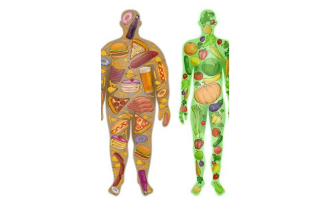How to deal with constipation? | Causes | Symptoms |The Impact of Dietary Habits

The most common gastrointestinal issue people face, from children to the elderly, is constipation. Sometimes it affects individuals temporarily, while at other times it can persist for longer periods. Constipation can occur for various reasons. Usually, the development of symptoms depends on lifestyle and dietary habits. In this article, we will briefly discuss all the potential issues related to constipation.
|
In this article |
What is constipation?
Constipation is a condition in which individuals experience difficulties during bowel movements. After eating, food passes through the digestive tract, and the intestines absorb nutrients. The colon (large intestine) stores our body's waste particles. The water from the waste particles is absorbed by the colon, making the stool harder. As a result, people experience more difficulties passing stool and are constipated.
People are identified as constipated if:
- Their stool becomes hard and passes in small pieces.
- They have bowel movements fewer than three times a week.
- They experience pain while passing stool.
Reasons behind constipation:
Constipation is a condition that can affect anybody for various reasons. Here we discuss some possible causes of constipation.
Lifestyle-related common causes:
For adults:
- Lack of water intake
- Low-fiber diet
- Lack of physical activity
- Stress
- During travel, especially for those on long trips, dietary routines can be disrupted, which may also impact bowel movements.
- Dependency on stimulant laxatives for bowel movements can create difficulties in passing stool naturally.
- In older age, many individuals find it challenging to chew food properly due to dentures. Those who struggle with chewing may face digestive issues that could lead to constipation.
For children:
- Lack of physical activity
- Inadequate potty training
- Poor dietary habits
- Changes in their daily dietary routine due to travel or transitions.
- Medicinal side effects, etc.
During pregnancy:
- Hormonal changes: During pregnancy, hormonal fluctuations cause the intestinal muscles to relax and slow down stool movement.
- Iron supplements: Taking iron supplements may contribute to constipation.
- Enlarged uterus: As the uterus enlarges during pregnancy, it exerts pressure on the lower portion of the intestine, making it more difficult for stool to pass.
- Dietary issues: In early pregnancy, some women experience nausea and vomiting. These conditions may hinder their ability to maintain a proper diet and consume enough water, potentially leading to constipation.
- Lack of physical activity.
Medical conditions and medicinal effects:
Certain medical conditions and medications can also be responsible for constipation.
Medical conditions:
Individuals with the following health issues may be prone to constipation:
- Irritable Bowel Syndrome
- Parkinson’s disease
- Hypothyroidism
- Diabetes
- Colon cancer
- Diverticulitis, etc.
Medicinal effects:
Various medications can also trigger constipation, including:
- Iron pills
- Painkillers
- Antacids
- Allergy medications
- Antidepressants
- Antinausea medications, etc.
Risk of uncontrolled constipation:
Constipation is not a disease; it can be managed. Individuals suffering from constipation need to be monitored regularly. Uncontrolled constipation may lead to serious health issues such as:
-
Piles, which can also occur due to chronic constipation, where tissues surrounding the anus become swollen.
-
Rectal bleeding.
-
Anal fissure (small tear around the rectum).
Symptoms:
-
The stool becomes hard.
-
Pain experienced while passing stool.
-
Discomfort felt after passing stool.
-
Need to exert extra pressure or use a finger to facilitate passing stool.
-
Individuals may experience abdominal pain, nausea, and lack of appetite.
How to deal with constipation:
-
Incorporate fiber-rich foods into your diet, including seasonal fruits, vegetables, beans, and whole grains.
-
Drink an adequate amount of water.
-
Stay active.
-
Limit processed foods as much as possible.
-
Avoid excessive consumption of tea, coffee, or sugary drinks, as these can lead to dehydration and trigger constipation.
-
Limit protein intake and aim for a balanced diet.
-
For children, proper potty training is essential.
-
During travel or transitions, ensure you drink enough water.
-
Avoid distractions like reading or using electronic devices while passing stool.
-
Consider using a stool softener or laxative, and consult an expert for guidance.
Bottom line:
Various factors contribute to constipation. In most cases, individuals find relief by adjusting their dietary habits, increasing water intake, and engaging in physical activity. If you experience chronic constipation, it is important to consult a healthcare professional and follow their recommendations.












0 Comments